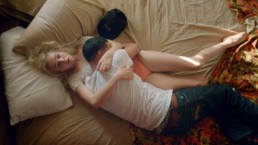Like Its Protagonist, ‘White Girl’ is an Alienating and Chaotic Watch
I really wanted to like it, but could just never get there.
This review previously ran on August 17, 2016, during the Sundance NEXT FEST
After screening “White Girl” on the second day of the Sundance Next Fest film festival, director Elizabeth Wood sat down for a Q&A with famed director Catherine Hardwicke (“Thirteen,” “Twilight”) and moderator Jen Yamoto, a journalist from The Daily Beast. One of Jen’s questions piqued my interest: In so many words, she asked Wood if any of the reviews had upset her – after all, “White Girl” is a very divisive film and so I would have expected Wood’s answer to sound well-rehearsed and politically correct. What she responded with shocked me. She said the reviews that cast “White Girl” in an unfavorable light must have been written by men, men who are lacking in their own sexual conquests to give her film an unbiased review. Well, I’m here to say that I am a white girl, and hold the same critiques that have followed “White Girl.”
“White Girl” tells the story of 18-year-old Leah (Morgan Saylor), a New York City transplant, who finds both love and trouble in gangbanger Blue (Brian ‘Sene’ Marc), the neighborhood drug dealer. While Leah herself is far from a virgin to the world of narcotics, falling for Blue leads her down a self-destructive path of zonked-out drug-fueled sweaty nights. When Blue gets busted for selling cocaine – his third strike – Leah naively tries to get him out of jail in any way she can, which ultimately ends up being a spiraling mess of destruction.
The association to Larry Clark’s “Kids” is inescapable; whereas Clark’s portrayal of impoverished NYC youth stands as a time capsule of adolescent life in the 90s, Wood’s “White Girl” doesn’t penetrate the thematic surface nearly deep enough to warrant essential viewing. This type of “Live Fast, Die Young” mentality that “White Girl” embodies results in a thinly felt story that tries too hard to look cool to be anything substantial. Although I have to say, the ending was the most powerful part of the entire movie, but maybe that’s because it’s just in those final moments when Leah finally processes her actions and the unjustifiable insanity that has just occurred.
I also just don’t see how “race” plays into this film at all, a poor mark on this director’s effectiveness to relay its meaning to this film. Arguably, Leah could have been of any ethnicity and the situations she found herself in would have been no different. There are no “implications of her being white or female,” the only struggle she faces is when she is high out of her mind and making terrible decisions. Her interracial relationship with Blue is never seen as taboo, aside from the fact that he sells drugs, and Leah certainly doesn’t act like there is any racial tension in her daily life. She has an internship at a predominately white culture & fashion magazine (along the lines of Nylon Magazine) with an attractive white boss (Justin Bartha), lives with a white roommate (India Menuez), and seeks help from a white lawyer (Chris Noth). Now the relationships she has with the above characters are not healthy ones, in fact, this is where I feel like the only social issue comes into play and that is peer pressure: pressure to snort drugs, sell drugs, and have sex. If more attention had been focused in this direction– an 18-year-old college student facing peer pressure from every which way– that would have been a more pertinent issue facing young girls today.
Yes, with its overtly explicit nature this subject matter is bold and has won fans since its Sundance debut, but unfortunately, so many of the directorial choices seemed purely for shock and awe. Other films with similar subject matter, such as “Bang Gang,” and “Heaven Knows What,” found a way to avoid falling under the “ostentatious” category. Elizabeth Wood has stated that “White Girl” had been a therapeutic project for her, a sort of biopic from her early college years. I’m hopeful that with this out of her system now, her next film will better utilize her voice and talents as a strong female director.
“White Girl” is not rated. 88 minutes. Opening at select Laemmle Theaters on Friday, September 9th.
Morgan Rojas
Certified fresh. For disclosure purposes, Morgan currently runs PR at PRETTYBIRD and Ventureland.

